#Portion control for weight loss is important
Note
Heyyy can I ask for weight loss tips ?
Yeah! I have a few but idk if they work, it's just a couple things I have done, so yeah (✿^‿^)
Log ur food BEFORE eating, it is easier to stick by that way
Walking is SO much better than running, it's low impact (so it's easier for injured ppl :D) and u can keep it up much longer than a run
A brisk walk can burn more than a run, my favorite (on a treadmill) is ~4.0 mph (~6.4 km/h), it is pretty easy to stick to, you work up a light sweat, and it burns abt 250 cal per hour
Take SMALL sips of water between each bite of food, like hold a cup with a straw, take a bite with one hand and sip with the other, if it's in ur hand (or at the edge of the table) it makes it easier, at first I would take like gulps but even just enough to wet ur tongue works
Portion ur snacks, if u have a big bag of like veggie chips portion it into the recommended serving size or whatever amount u want, otherwise u might eat more and it's harder to control urself, if it's in containers or little bags whatever, just portion
Eat ur healthy food first, if u have a balanced meal eat ur vegetables and fruit first, then move up for calories, so eat ur food lowest cal to highest bc u might get full from the lower cal stuff first, save some fruit for the end of ur meal tho so ur mouth feels clean and the reason why ppl eat dessert/crave sweetness after eating is because their body is craving fruit to aid digestion
Try little workout apps (yk the stupid ones like "lose weight in 30 days) it may not be much but it gets u to burn a few extra calories in a short time if ur busy, they are fairly easy and beginner friendly, and depending on which one u can actually feel them work if u want to burn more than just a bit, it also holds u accountable
Adjust ur calorie limit by weight, if u lose like 10 lbs (4.5 kg) u can't consume the same amount of calories bc ur maintenance amount is lower now and u will plateau
I recently started this, but have a weight tracker on ur body, I have a chain that I put on like permanent jewelry around my waist, it's like African waist beads or I think in Latin America they use like a string, it makes it so if u don't know when to stop eating it will tell u by the way ur stomach expands
DRINK DRINK DRINK WATER, I try to drink at LEAST a US gallon (~4 l) every day
OMAD is one of the BEST things if u live with family, skip ur insignificant meals and the one ur family most often sits together/finds "important" is the one u eat
If ur at home and ur craving food, take a shower, take a shower, take a couple hours for self care, pamper ur skin a bit, by the time ur done u will feel fresh and the craving will probably be gone
Try to not "give up" like if u have eaten like crap and u want a cookie try to not be like "oh well I'm doing bad enough today anyway" personally that just leads to more guilt and purg1ng
Ok this one may sound a bit weird, but gaslight urself, after eating some and the feeling in ur stomach changes be like "omg I'm so full" and keep saying it aloud, and if u eat more u will lowkey be shamed by others bc they will say stuff like "I thought u were full", gaslight urself into being like "I don't feel hungry" I do those two a lot but, gaslight urself into liking things, disliking things, putting in effort, etc.
This one rly made me work out, if I am laying in bed and I am a bit (even just a teeny TINY bit) restless I tell myself "if I'm just gonna scroll [Tumblr] I might as well walk while I do it" and then I consciously get up, walk into my basement, and on this treadmill we got (it was free from a friend and the middle is broken but it functions enough, and it's still snowing where I live), it doesn't matter what u wear, as long as u can make urself get up u and exercise it's a win (esp with depression lol), I have worked out in nice little workout clothes to rly give the vibes but I have also worked out in pajamas, my 16 km walk for my birthday I did on the treadmill in fluffy socks (I got rly bad blisters so I don't recommend it but it turned out fine, I was planning on a short little walk but it just extended a whole lot) just getting urself up is a win so whatever it takes, do it
If u have workout equipment at home, u don't have to raw dog it, listen to music, read a book, scroll on Tumblr, etc. no one says u can't
In my experience eating even a bit during a fast just leads into temptation, I do better when I don't eat at all than eating a bit bc after I eat a bit I see how hungry I am
That was a lot but those r the ones I can think of off the top of my head, if I remember more I can post more if u want, but yk what? Don't feel bad, ik it sounds stupid but it rly is the best thing u can do, if u binge move on, it's in the past, if u r not able to get up and exercise that's ok, just by being ur beautiful self u burn calories, if ur exhausted and u need something to run on eat a snack, it's better to be able to keep going than drown
I don't know if anyone will rly make it all the way down here but I just want u all to know u r loved by sooo many ppl no matter what u look like, every single one of u are art and art is in the eye of the beholder, I hope ur fast goes easy and u lose a kilo before u step on a scale again
Ily all and stay safe ♡♡♡
#thinnerpls#thigh g4p#an@rexi@#purg1ng#mi@#th1gh g@p#pro for me not for thee#3d blog#sk1nny legs#🕯️as a feather#an@ tips#@n@ tips#weight loss tips
81 notes
·
View notes
Text
Which is the best foods for weight loss in united states ?
The best foods for weight loss in the United States combine nutritional value, portion control, and sustainable eating habits. Here are some attractive options:
Leafy Greens: Incorporate kale, spinach, and Swiss chard into your meals. They're low in calories but packed with essential vitamins, minerals, and fiber.
Lean Proteins: Opt for skinless poultry, lean cuts of beef or pork, tofu, and legumes. Protein helps you feel full and preserves muscle mass.
Fruits: Enjoy colorful fruits like berries, apples, and citrus. They're rich in antioxidants and fiber, making them satisfying and nutritious.
Whole Grains: Choose whole grains like quinoa, brown rice, and whole wheat bread. They're fiber-rich and provide lasting energy.
Nuts and Seeds: Almonds, walnuts, and chia seeds are excellent sources of healthy fats and protein. They also keep you feeling full longer.
Fish: Fatty fish like salmon and mackerel are high in omega-3 fatty acids, which support heart health and can aid in weight loss.
Greek Yogurt: It's protein-packed and can be a creamy, satisfying snack or breakfast option.
Vegetables: Broccoli, cauliflower, and Brussels sprouts are low in calories and high in fiber. They make great additions to meals.
Avocado: While calorie-dense, avocados provide healthy fats and fiber, helping control appetite.
Beans and Lentils: They're rich in protein and fiber, keeping you full and stabilizing blood sugar levels.
Water: Don't forget the importance of staying hydrated. Drinking water before meals can help control portion sizes.
Herbs and Spices: Flavor your dishes with herbs and spices instead of salt or high-calorie sauces.
Remember, the key to successful weight loss is not only about individual foods but also about overall dietary patterns and lifestyle choices. A balanced diet, portion control, regular physical activity, and consistency are essential for achieving and maintaining a healthy weight. Consult a healthcare professional or a registered dietitian for personalized guidance on your weight loss journey.
Read more helpful information about health & fitness :
#weightloss#lose weight#weight loss journey#i need to lose so much weight#nutrition#health and fitness#healthy lifestyle#healthy living#healthy eating#workout#exercise#healthy#healthy food#spiritual development#i wanna be weightless#i want to be weightless#i will be thinner#i love him#am#love
115 notes
·
View notes
Text
Understanding Body Types: Ectomorph, Mesomorph, and Endomorph

When it comes to fitness and achieving your health goals, understanding your body type can be a game-changer. We all have different genetic predispositions that influence how our bodies respond to exercise and nutrition. The concept of body types, often categorized as ectomorph, mesomorph, and endomorph, can help you tailor your fitness and diet strategies for more effective results. In this article, we'll delve into each of these body types, helping you better understand your own and how to optimize your fitness journey accordingly.
Ectomorph: The Lean Machine
Ectomorphs are typically characterized by a lean and slender physique. They often have a high metabolism, which means they burn calories quickly. Key features of ectomorphs include:
Narrow shoulders and hips: Ectomorphs tend to have a more linear body shape.
Fast metabolism: They may find it challenging to gain weight or muscle.
Lean muscle mass: Ectomorphs often have difficulty building muscle mass.
Fitness and Nutrition Tips for Ectomorphs:
Focus on strength training: Ectomorphs should prioritize resistance training to build lean muscle mass.
Increase calorie intake: To gain weight and muscle, ectomorphs should consume a surplus of calories, emphasizing quality nutrition.
Frequent, smaller meals: Eating smaller, more frequent meals can help maintain energy levels and support muscle growth.
Mesomorph: The Athletic Build
Mesomorphs are known for their athletic and well-proportioned bodies. They typically have an easier time both gaining muscle and losing fat. Key features of mesomorphs include:
Naturally muscular: Mesomorphs have an easier time building and maintaining muscle.
Broad shoulders and a narrow waist: They often have an hourglass or V-shaped body.
Efficient metabolism: Their bodies tend to respond well to both muscle gain and fat loss efforts.
Fitness and Nutrition Tips for Mesomorphs:
Variety in workouts: Mesomorphs can excel in a range of fitness activities, so they should incorporate both cardio and resistance training for overall health.
Balanced diet: Focus on a balanced diet with lean protein, carbohydrates, and healthy fats to support muscle growth and recovery.
Stay active: Regular exercise is crucial to maintaining their physique.
Endomorph: The Natural Curves
Endomorphs typically have a rounder and softer body shape. They have a slower metabolism and are more prone to weight gain. Key features of endomorphs include:
Rounder physique: Endomorphs often carry weight in the form of curves.
Slower metabolism: They may find it challenging to lose weight or body fat.
Greater potential for muscle mass: Endomorphs can build muscle but should be mindful of body fat levels.
Fitness and Nutrition Tips for Endomorphs:
Embrace cardiovascular exercise: Endomorphs can benefit from regular cardio to manage weight and maintain cardiovascular health.
Portion control: Pay attention to portion sizes and calorie intake to avoid excess weight gain.
Strength training: Incorporate strength training to build muscle and boost metabolism.
Conclusion:
Understanding your body type is a valuable step toward reaching your fitness and health goals. While these categories can provide guidance, it's important to remember that everyone is unique, and a one-size-fits-all approach doesn't work in fitness and nutrition. Tailoring your strategy based on your body type is just one piece of the puzzle. Consult with fitness professionals and nutritionists to create a personalized plan that aligns with your goals and works best for you. Remember that consistent effort, a healthy lifestyle, and patience are key components of any successful fitness journey, regardless of your body type.
23 notes
·
View notes
Text
What is the right diet for losing fat?
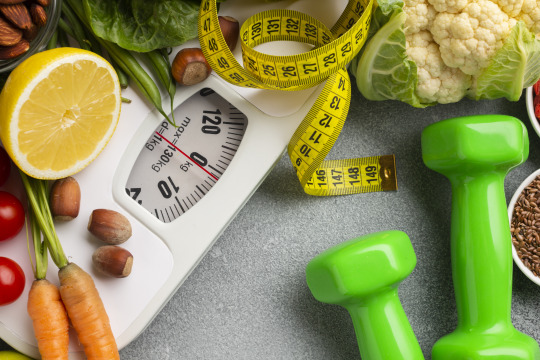
The right diet for losing fat varies from person to person based on individual factors such as age, gender, weight, activity level, and any underlying health conditions. However, there are some general principles that can help:
Caloric Deficit: The most important factor in losing fat is to consume fewer calories than you expend. This creates a caloric deficit, prompting your body to burn stored fat for energy. You can achieve this by reducing your calorie intake, increasing your physical activity, or a combination of both.
Balanced Macronutrients: Your diet should include a balance of carbohydrates, proteins, and fats. Focus on whole, nutrient-dense foods such as fruits, vegetables, lean proteins, whole grains, and healthy fats.
Protein Intake: Protein is crucial for preserving muscle mass while losing fat and can help you feel full and satisfied. Aim to include a source of protein in each meal, such as lean meats, poultry, fish, eggs, dairy products, legumes, tofu, or tempeh.
Healthy Fats: Include sources of healthy fats in your diet, such as avocados, nuts, seeds, olive oil, and fatty fish like salmon. These fats can help keep you full and support overall health.
Complex Carbohydrates: Choose complex carbohydrates over simple ones. Whole grains like quinoa, brown rice, oats, and whole wheat products provide fiber, which can aid in digestion and help you feel fuller for longer periods.
Portion Control: Be mindful of portion sizes to avoid overeating. Use smaller plates, measure your servings, and pay attention to hunger and fullness cues.
Limit Processed Foods and Added Sugars: Minimize your intake of processed foods, sugary snacks, and beverages as they tend to be high in calories and low in nutrients. Opt for whole, unprocessed foods whenever possible.
Stay Hydrated: Drink plenty of water throughout the day. Sometimes, thirst can be mistaken for hunger, leading to unnecessary calorie consumption.
Meal Timing: Some people find success with intermittent fasting or eating within a specific window of time each day. Experiment with different meal timing strategies to see what works best for you.
Consistency and Patience: Losing fat takes time and consistency. Focus on making sustainable changes to your diet and lifestyle rather than seeking quick fixes.
Mindful Eating: Pay attention to your body's hunger and fullness cues. Eat slowly and mindfully, savoring each bite, and stop eating when you feel satisfied, rather than full.
Include Fiber-Rich Foods: Fiber-rich foods such as fruits, vegetables, whole grains, and legumes can help regulate digestion, keep you feeling full, and support overall health.
Limit Liquid Calories: Be cautious of high-calorie beverages such as sugary sodas, fruit juices, and alcoholic beverages, as they can contribute to weight gain without providing satiety. Opt for water, herbal tea, or other low-calorie options instead.
Be Flexible: Allow for flexibility in your diet to accommodate social occasions or cravings. It's okay to enjoy treats in moderation, as long as they fit within your overall calorie and macronutrient goals.
Track Your Progress: Keep track of your food intake and progress toward your goals using a food diary, mobile app, or other tracking tools. This can help you stay accountable and make adjustments as needed.
Prioritize Sleep: Aim for 7-9 hours of quality sleep per night. Inadequate sleep can disrupt hunger hormones and metabolism, making it harder to lose fat.
Manage Stress: Chronic stress can lead to overeating and weight gain. Practice stress-reducing techniques such as mindfulness, meditation, yoga, or spending time outdoors to support your fat loss efforts.
Include Strength Training: Incorporate strength training exercises into your fitness routine to build and maintain muscle mass. Muscle tissue burns more calories at rest than fat tissue, so increasing your muscle mass can help boost your metabolism.
Stay Consistent: Consistency is key when it comes to fat loss. Stick to your healthy eating plan and exercise routine even on days when you don't feel motivated. Small, sustainable changes over time can lead to significant results.
Seek Support: Surround yourself with supportive friends, family members, or online communities who can encourage and motivate you on your fat loss journey
Having a support system can make it easier to stay on track and overcome challenges.
By incorporating these additional points into your fat-loss diet, you can optimize your efforts and increase your chances of success. Remember that what works best for one person may not work for another, so it's essential to find an approach that fits your individual preferences, lifestyle, and goals.
Before making any significant changes to your diet, it's a good idea to consult with a healthcare professional or a registered dietitian, especially if you have any underlying health conditions or dietary restrictions. They can provide personalized guidance tailored to your individual needs and goals.
#fatloss#healthy#health#lose weight#weight loss#weightloss#diet to lose weight#fat loss#losing weight#fatlosstips#weightloss goals#weight loss success stori#weight loss motivation#weight loss tips#diet#dieting#weight management#weight loss diet#healthy living#healthcare#health and wellness#healthblr#health & fitness#healthy eating#healthy diet#healthy recipes#healthyfood#health tips#fitness and exercise#fitness
12 notes
·
View notes
Text
Grocery shopping/Food
Inflation is a huge thing right now and people keep asking how to lower your grocery budget. I grew up poor. Here are some tips I learned over the years. Just my opinions/tips:
There are alot of things a person can do to build food stability- IF you have the space and resources.
First one is gardening. An herb garden, a patio pot garden or a yard garden. I also did little stints of guerilla gardening, which is basically planting veggies in weird places. You can Google victory gardens to see how they used to do it back in the 40's.
Also, if you have a house with a yard, consider planting a fruit tree and some fruit bushes.
But as far as grocery shopping goes, if you have a limited budget & are on a weight loss journey, the first thing you should do is stop (or severely limit) shopping from the inside grocery aisles.
Why?
Because these foods might seem inexpensive, but it is really common to overeat those foods. They are designed to be hyperpalatable.
I recently saw an episode of Heavy where the person was cooking 3 boxes of some meal.... and eating them all.
If you buy these foods at all, you need to practice portion control with them. Check the box for the serving size and then divide it into individual servings before you start eating it.
It is really important that you don't beat yourself up for wanting this food. It is designed that way. Your body is a biological machine of sorts and it has evolved to *want* foods that have certain levels of fat, salt & carbs. It is because these are the foods that helped us survive.
When shopping the perimeter, I normally take a walk around to see what foods have volume so a low price. Some suggestions are potatoes, collard greens, radishes. But really, I will try anything that is low cost. Give it a shot and see if you like it.
That is how I starting eating collard greens. Walmart had huge bags of them for like $2. I bought a bag and threw in some greens with every meal. Why not?
You don't need designer greens that are $10 a pound.
So yesterday, the thing I would have bought for cheap and tried was fresh bunches of turnips greens for $1.29, and mustard greens for about the same (I am traveling tomorrow so I won't have time so cook it).
Be curious and explore. You may be able to find ways to stretch your budget using unpopular foods. Unfortunately, the internet has popularized some previously staple foods - eggs, cottage cheese, cauliflower etc. But do what you can with what you have, and use portion control so that you are making things last.
Sometimes you can find frozen foods for good prices- I found pags of peas at Walmart for $.84. Peas! Hell yeah! I added Pease to everything. Peas have some protein and a good nutrient profile.
In contrast, a box of weight watchers protein candy bars were $5 for 4 bars. ON SALE. Ugg. That is a treat option... but those food products are so freaking expensive per serving I am trying to limit those.
Other things I did was watch videos on how people got by in the depression...and try some of those meals. Read older books and see what they were eating.
Our food acquisition has changed dramatically in the last 100 years. People used to do alot more foraging, hunting, & fishing. We don't have access to some of those things anymore. And if you do have access, definitely try those things as well. If you have access to buy food from a farmer/rancher, do it.
Now we have food deserts. But that is a post for a different time.

#groceries#grocery store#grocery shopping#grocery haul#healthy lifestyle#getting healthy#losing weight#healthy eating#fitblr#healthy habits#operation lose this gut#weight loss#operationlosethisgut#weight loss journey#shopping#food#food scarcity#poor#food tips#budget food#budget#grocery shopping tips#veggies#sales#clearance
36 notes
·
View notes
Text
beginner diet plan for weight loss for female
General Tips:
Focus on Whole Foods: Prioritize fruits, vegetables, whole grains, and lean protein sources. These are filling and nutrient-rich, keeping you feeling satisfied and promoting healthy weight loss.
Hydration is Key: Drink plenty of water throughout the day. Water curbs hunger, keeps you feeling full, and supports overall health. Aim for 8 glasses (around 2 liters) per day.
Portion Control: Use smaller plates and bowls to avoid overeating. Be mindful of serving sizes.
Limit Processed Foods, Sugary Drinks, and Unhealthy Fats: These tend to be high in calories and low in nutrients, hindering weight loss efforts.
Sample Daily Meal Plan (1500 Calories):
Breakfast (350-400 Calories):
Option 1: Greek yogurt with berries and a sprinkle of granola
Option 2: Whole-wheat toast with scrambled eggs and spinach
Option 3: Oatmeal with sliced banana and a drizzle of honey
Lunch (400-450 Calories):
Option 1: Tuna or chicken salad sandwich on whole-wheat bread with lettuce and tomato
Option 2: Lentil soup with a side salad and whole-wheat crackers
Option 3: Leftovers from dinner (portion control is important!)
Dinner (500-550 Calories):
Option 1: Baked salmon with roasted vegetables and brown rice
Option 2: Chicken breast stir-fry with mixed vegetables and brown rice
Option 3: Vegetarian chili with a side salad and a dollop of Greek yogurt
Snacks (100-150 Calories each, 2-3 per day):
Option 1: Apple slices with almond butter
Option 2: Carrot sticks with hummus
Option 3: Handful of mixed nuts and dried fruits (unsweetened)
Option 4: Cottage cheese with sliced cucumber and tomato
Option 5: Plain yogurt with a sprinkle of chia seeds
I will give you a weight loss meal plan 1200 calories
#i wanna lose weight#need to lose more weight#anor3c1a#tw weight#weight loss#weight mention#bulemiia#anasp0#bonespø#thinspø#anorecyc#anorexla#@n@ tips#@na rules#@nor3xia#@n@ diary#@na motivation#@na vent#@na buddy#⭐️ ing motivation#⭐️rving#⭐️vation goals#⭐️ve#4nerex1a#4n4t1ps#4n4blr#4n0rexic#bulim14#bul1m14#tw weighloss
9 notes
·
View notes
Note
Do you mind if I ask your top 10 favorite characters (can be male or female) from all of the media that you loved (can be anime/manga, books, movies or tv series)? And why do you love them? Sorry if you've answered this question before.....Thanks...
Hello, and thank you for this ask!
It's really tough to pick just a few… I'll have to split this into two posts due to tumblr's word limit, but here are some that immediately come to mind. Remember, this list isn't exhaustive and isn't in any particular order. (Here's part two.)
(Warning: this list may include spoilers!)
Tyrion Lannister - His wit, intelligence, and resilience make him one of the most entertaining and tragic characters in ASOIAF. Despite being born into one of the wealthiest and most powerful families in Westeros, he faces discrimination and cruelty due to his dwarfism. He didn't inherit the beauty of his siblings, nor is he tall, handsome, or skilled with a sword, and he's not particularly well-liked by others. But Tyrion holds a pivotal role in the series for good reason, and it's rare to encounter such a masterfully crafted and captivating protagonist who also grapples with disability. As Varys once said, "ofttimes a very small man can cast a very large shadow."
Arya Stark - She stands as one of the most compelling and complex female characters in ASOIAF, yet she often remains underappreciated and misunderstood within fandom circles. While some may see her as a tomboyish archetype (forgetting that GRRM penned the books in the early 90's, a time when Arya's character was quite revolutionary in fiction), Arya's character transcends clichés to embody a raw and heartbreaking portrayal of a girl thrust into the brutality of war and forced to navigate a world torn apart by conflict as a child soldier. Separated from her family and faced with unimaginable challenges, Arya's unwavering determination to survive is both inspiring and heart-wrenching. What sets Arya apart is her multifaceted nature. She embodies a mix of magic, cunning, animalism, spirituality, and femininity, making her a rich and dynamic character. Her connection to her direwolf Nymeria and her training with the Faceless Men add layers of mystique to her narrative, while her unwavering sense of self and identity challenges traditional gender roles which modern readers can relate with.
Eugenides & Irene (because I can't mention one without the other) - In The Queen's Thief series, Eugenides, known as Gen, isn't just a master thief; beneath his sharp wit and roguish façade lies a man burdened by profound grief and the challenges of his disability. His journey through pain and loss adds intricate layers to his character, making him all the more compelling. As for Irene, the formidable queen of Attolia, her intelligence and resourcefulness are matched only by her inner turmoil. While she deftly navigates political challenges, the weight of her responsibilities and the harm inflicted upon her loved ones weigh heavily on her conscience. Their intertwined destinies and the magnetic pull between them form the heart of their portion of the series, making their romance a standout element of the story.
Ella of Frell - The curse placed upon Ella in Ella Enchanted, one of my cherished childhood books, serves as a powerful metaphor for the struggle many girls face in asserting their agency and setting boundaries. Forced to obey any command given to her, Ella's curse robs her of control over her own actions and decisions, leaving her vulnerable to manipulation and exploitation. Ella's struggle to assert her independence and reclaim her agency is a central theme of the novel, and it highlights the importance of standing up for oneself and setting boundaries. This aspect of her character resonates deeply with readers, particularly young girls, who may relate to the feeling of being powerless in certain situations.
Achilles - One of the most powerful moments in the Iliad is Achilles' encounter with Priam, Hector's grieving father. Priam's act of kissing Achilles' hands, despite them being responsible for Hector's death, demonstrates remarkable humility and shared grief. This profound display of empathy moves Achilles to return Hector's body to Priam. In this moment, Achilles transcends his own ego and recognizes the universal experience of loss and mourning. By agreeing to return Hector's body, Achilles symbolically abandons his pursuit of personal glory, finding redemption and closure.
8 notes
·
View notes
Note
Do you mind sharing your weight loss tips? I’ve been struggling to try to lose weight
i am no expert whatsoever but what’s working for me personally is walking/jogging everyday, getting 7-8 hours of sleep a night if i can, eating smaller portions, upping my protein intake so i’m more satiated after meals (i try to eat at least 100g of protein a day, or 30+ grams a meal), and eating less sugar (meaning foods with added/processed sugar). i still have sugar when i want but i don’t go overboard like i used to.
i go for a three mile walk everyday if i can, which takes me about 50 minutes to an hour depending on how fast i’m walking. i’ve also been running periodically during my walks. nothing too intense, just a jog but it gets my heart rate up. if i don’t have time for 3 miles i just do 1 mile. as long as i get my body moving for at least 30 minutes a day i’m good. if you can’t go for walks outside and don’t have access to a treadmill i recommend growwithjo’s walking workouts, she has lots of fun indoor stuff you can do (and you don’t need any equipment either). her workouts have been the only ones i’ve actually enjoyed doing.
i also have an apple watch which helps me track my steps and workouts and that’s been huge for me, it motivates me to close my move ring every single day. any kind of fitness tracker will do. you can just use your phone to track your steps as well. i try to hit 10k steps a day.
the best thing for me was starting out slow. i told myself i would walk 30 minutes everyday for 20 days. when i proved to myself i could do that i then decided to add 30 more minutes to that and take an hour walk everyday. as far as food/drink consumption, i told myself that i would stop going out for coffee so much. now i only go once a week, if that. then i told myself i could eat the foods i wanted, just smaller portions, and i had to supplement more protein. little changes like that have been super helpful for me. i didn’t start all at once, i’ve been doing things gradually and it’s really been helpful. usually i just get overwhelmed every time i try to take control of my health but now i feel like i’m getting the hang of it little by little.
most importantly, be patient with yourself and your body. you might not see any results for a while but don’t give up. i tell myself even if i don’t lose weight, i’m still moving my body every day and that’s what’s most important.
17 notes
·
View notes
Text
The Impact of Psychological Health on Weight Loss Diet Success

تأثير الصحة النفسية على نجاح النظام الغذائي لإنقاص الوزن
وإليك نظرة عامة:
Understanding the Connection Between Psychological Health and Weight Loss
The Role of Stress and Emotional Well-being in Dieting Success
Overcoming Psychological Barriers to Sustainable Weight Loss
Mindful Eating and Its Impact on Psychological Health and Weight Loss
The Influence of Self-esteem and Body Image on Diet Success
The Power of Positive Thinking in Achieving Weight Loss Goals
Addressing Emotional Eating and Stress-induced Food Cravings
Coping Strategies for Dealing with Emotional Challenges During Weight Loss Journey
Seeking Professional Help: The Importance of Mental Health Support in Weight Management
Incorporating Mind-Body Practices for Holistic Wellness and Successful Weight Loss
Understanding the Connection Between Psychological Health and Weight Loss
I believe that psychological health plays a crucial role in the success of weight loss diets. Here are some key points to consider:
Emotional Eating: Emotional well-being can impact eating habits. Stress, anxiety, or depression can lead to emotional eating, where food is used as a coping mechanism.
Motivation and Discipline: A positive mindset and strong mental health are vital for staying motivated and disciplined throughout a weight loss journey.
Self-image: How we perceive ourselves can affect our weight loss efforts. Positive self-image is linked to better adherence to healthy habits.
Stress Management: Effective stress management techniques can prevent emotional eating and promote healthier choices.
Support System: Surrounding yourself with a supportive network can enhance psychological well-being and increase weight loss success.
Understanding and addressing the connection between psychological health and weight loss is essential for achieving sustainable results.
The Role of Stress and Emotional Well-being in Dieting Success
I believe that managing stress is crucial for successful weight loss. When we are stressed, our bodies release cortisol, a hormone that can lead to weight gain, especially around the midsection. Stress can also trigger emotional eating, causing us to reach for comfort foods high in sugar and fat.
To improve emotional well-being while dieting, I suggest practicing mindfulness techniques such as deep breathing, meditation, or yoga. These activities can help reduce stress levels and prevent emotional eating episodes. Additionally, seeking support from a counselor or therapist can be beneficial in addressing underlying emotional issues that may contribute to unhealthy eating habits.
Overall, taking care of our emotional health is just as important as monitoring our food intake when it comes to achieving successful weight loss.
Overcoming Psychological Barriers to Sustainable Weight Loss
I believe that addressing psychological barriers is crucial for achieving long-term success in weight loss. To overcome these barriers, I focus on the following strategies:
Identifying Triggers: I pinpoint situations or emotions that lead to unhealthy eating habits.
Building Resilience: I work on developing coping mechanisms to deal with stress or negative emotions without turning to food.
Setting Realistic Goals: I set achievable targets to prevent feelings of failure that may hinder progress.
Practicing Mindfulness: I cultivate mindfulness to foster better awareness of my eating behaviors and emotions.
By actively working on these aspects, I can overcome psychological barriers and maintain sustainable weight loss successfully.
Mindful Eating and Its Impact on Psychological Health and Weight Loss
I have found that practicing mindful eating can have a significant impact on both psychological health and weight loss. When I am more mindful of my eating habits, I tend to regulate my emotions better and reduce stress levels. This, in turn, helps me make healthier food choices and control my portions. By focusing on the present moment and being aware of my hunger cues, I can prevent overeating and mindless snacking.
Incorporating mindfulness into my eating routine has also improved my relationship with food and my body. I no longer view certain foods as "good" or "bad," and instead, I savor each bite and appreciate the nourishment it provides. This shift in mindset has led to a more sustainable approach to weight loss, as I am more likely to stick to a balanced and nutritious diet.
The Influence of Self-esteem and Body Image on Diet Success
I firmly believe that self-esteem and body image play a significant role in the success of a weight loss diet. When individuals have high self-esteem and a positive body image, they are more likely to stick to their diet plan and make healthier choices. On the contrary, those with low self-esteem may struggle with motivation and may give in to unhealthy eating habits more easily. Improving self-esteem and body image through positive affirmations, self-care practices, and seeking support from loved ones can boost long-term diet success. It is crucial to address these psychological factors alongside dietary changes for sustainable weight loss.
The Power of Positive Thinking in Achieving Weight Loss Goals
I believe that adopting a positive mindset is crucial when it comes to achieving weight loss goals.
Positive thinking can help me stay motivated and focused on my journey to a healthier lifestyle.
Reminding myself of my progress and celebrating small victories can reinforce positive thinking.
Visualizing my end goal and believing in my ability to reach it can significantly impact my weight loss success.
Surrounding myself with supportive and encouraging people can also contribute to maintaining a positive outlook throughout my weight loss journey.
Addressing Emotional Eating and Stress-induced Food Cravings
I need to recognize triggers that lead to emotional eating and stress-induced food cravings. These triggers can include emotions like sadness, loneliness, or anxiety. By identifying these triggers, I can develop healthier coping mechanisms to deal with emotions instead of turning to food. Engaging in stress-reducing activities such as meditation, exercise, or deep breathing can be helpful in managing stress levels and reducing the urge to overeat. It's essential to build a support system to discuss emotions and stressors, preventing them from manifesting in unhealthy eating habits.
Coping Strategies for Dealing with Emotional Challenges During Weight Loss Journey
I have compiled some coping strategies that have helped me navigate emotional challenges during my weight loss journey:
Seek Support: Surround yourself with a supportive network of friends, family, or a therapist to lean on when times get tough.
Practice Self-Care: Take time for yourself by engaging in activities that bring you joy and relaxation, such as meditation, reading, or taking a bath.
Set Realistic Goals: Break down your weight loss goals into smaller, achievable targets to prevent feeling overwhelmed.
Mindful Eating: Practice being present while eating to better recognize hunger and fullness cues, helping you avoid emotional eating triggers.
Celebrate Non-Scale Victories: Recognize and celebrate accomplishments beyond just the number on the scale, such as increased energy levels or improved mood.
Remember, it's essential to prioritize your emotional well-being alongside your physical health throughout your weight loss journey.
Seeking Professional Help: The Importance of Mental Health Support in Weight Management
I believe that seeking professional help is crucial when it comes to weight management and achieving long-term success. Here are some reasons why mental health support plays a significant role in this process:
Personalized Guidance: Working with a mental health professional can provide personalized guidance tailored to your individual needs and challenges.
Behavioral Changes: Addressing underlying psychological issues can help in making sustainable behavioral changes that support weight loss efforts.
Emotional Support: Dealing with weight-related issues can be emotionally challenging, and having a professional to talk to can provide much-needed emotional support.
Identifying Triggers: Mental health professionals can assist in identifying emotional triggers that may lead to overeating or unhealthy food choices.
Incorporating mental health support into your weight management journey can make a significant difference in your overall success.
Incorporating Mind-Body Practices for Holistic Wellness and Successful Weight Loss
I believe that integrating mind-body practices into your weight loss journey can lead to holistic wellness and improved success. Here are some effective strategies to consider:
Mindful Eating: Paying attention to hunger cues and savoring each bite can help prevent overeating and promote healthier food choices.
Yoga and Meditation: These practices can reduce stress levels, improve self-awareness, and enhance mindfulness, leading to better decision-making around food.
Breathing Exercises: Deep breathing can calm the mind, reduce stress, and improve focus, which can support adherence to a weight loss plan.
Positive Affirmations: Using affirmations can boost self-esteem and motivation, helping you stay committed to your weight loss goals.
By incorporating these mind-body practices, you can foster a healthy mindset and overall well-being while achieving successful weight loss.
#weight loss journey#dieting#diet#low cal diet#Wright loss#Psychological health#health & fitness#health tips
4 notes
·
View notes
Text
Supporting My Weight Loss Journey with Dr. Struthers' Solution.
As someone actively managing my weight, I've been trying Dr. Struthers' Ultimate Weight Loss and Wellbeing Solution for a while now. While long-term weight loss is definitely a marathon, not a sprint, I've noticed some positive changes that have been helpful:

Energy Boost: I used to struggle with afternoon slumps, but the supplements' green tea extract and caffeine give me a natural pick-me-up, helping me stay active throughout the day.
Curbed Cravings: I used to mindlessly snack between meals, but the supplement keeps me fuller for longer, making it easier to control my portion sizes.
Convenient Routine: Having everything pre-measured and portioned out makes it easier to stay consistent with taking the supplements, which has become a helpful part of my overall weight management routine.
It's important to remember that everyone's different, and I always prioritize a healthy diet and regular exercise alongside the supplements. I also spoke to my doctor before starting, which is definitely important.
Overall, Dr. Struthers' solution has been a valuable addition to my weight loss journey, providing a convenient way to potentially boost my energy, manage cravings, and stay on track. Remember, consistency with a healthy lifestyle is key, but this supplement can offer helpful support along the way.
#nutrition#skincare#yoga#marketing#fitblr#i wanna lose weight#i need to lose so much weight#weight loss#gaining weight on purpose#nutrients
3 notes
·
View notes
Text
The Definitive Guide to Effective Diet Plans for Optimal Health
Chapter 1: Understanding the Importance of a Diet Plan
Embarking on a journey towards weight loss or weight gain requires a comprehensive understanding of the role a diet plan plays in achieving your goals. A diet plan serves as the foundation upon which you build your nutritional habits, guiding your food choices and portion sizes to align with your objectives. For those aiming to shed excess pounds, a well-structured diet plan not only facilitates weight loss but also ensures that you do so healthily and sustainably. Similarly, individuals seeking to gain weight can utilize a diet plan to strategically increase calorie intake and promote muscle growth. Whether your goal is to slim down or bulk up, a carefully curated diet plan provides structure and guidance, empowering you to make informed decisions about your nutrition. By adhering to a personalized diet plan, you can optimize your nutrient intake, regulate your metabolism, and achieve lasting results.
Chapter 2: Diet Plan for Weight Loss
For many individuals, embarking on a weight loss journey can be daunting, but with a well-crafted diet plan, success becomes attainable. A diet plan for weight loss typically involves reducing calorie intake while ensuring adequate nutrient consumption to support overall health. This often entails incorporating more fruits, vegetables, lean proteins, and whole grains into your meals, while limiting processed foods, sugary snacks, and high-calorie beverages. By creating a calorie deficit through diet and physical activity, you can effectively shed excess pounds and improve your body composition. Moreover, a sustainable weight loss diet plan emphasizes portion control, mindful eating, and behavioral changes to promote long-term success and prevent weight regain. With consistency and dedication, adhering to a tailored diet plan can lead to significant improvements in both physical health and overall well-being.
Chapter 3: Diet Plan for Weight Loss at Home
Achieving weight loss goals from the comfort of your own home is entirely feasible with the right approach. A diet plan for weight loss at home involves making mindful food choices, preparing meals with wholesome ingredients, and establishing a supportive environment conducive to healthy living. By stocking your kitchen with nutritious staples and planning meals ahead of time, you can avoid impulsive eating and stay on track with your dietary goals. Additionally, incorporating regular physical activity into your daily routine complements your diet plan, further enhancing weight loss outcomes. With the convenience of home-cooked meals and the flexibility to customize your environment, implementing a diet plan for weight loss at home offers both convenience and effectiveness.
Chapter 4: Beginner Diet Plan for Weight Loss for Female
Women embarking on their weight loss journey may benefit from a beginner-friendly diet plan tailored to their specific needs and preferences. A beginner diet plan for weight loss for females focuses on establishing healthy eating habits, gradually reducing calorie intake, and incorporating regular physical activity into daily routines. This may involve starting with simple meal swaps, such as replacing sugary beverages with water or opting for grilled chicken over fried alternatives. Additionally, incorporating nutrient-dense foods like fruits, vegetables, and lean proteins provides essential vitamins and minerals while promoting satiety. By starting with manageable changes and gradually progressing, beginner female weight loss enthusiasts can build confidence and momentum towards their goals, setting the stage for long-term success.
Chapter 5: Benefits of a Diet Plan
The benefits of implementing a diet plan extend far beyond weight management, encompassing various aspects of physical, mental, and emotional well-being. A well-structured diet plan promotes optimal nutrition, supplying the body with essential nutrients needed for energy production, immune function, and cellular repair. By prioritizing nutrient-rich foods and balanced meals, individuals can enhance their overall health and reduce the risk of chronic diseases such as diabetes, heart disease, and certain cancers. Moreover, a diet plan fosters mindfulness around eating habits, encouraging individuals to tune into hunger and fullness cues, thereby preventing overeating and promoting a healthy relationship with food. Additionally, for those aiming to achieve specific fitness or performance goals, a tailored diet plan provides the necessary fuel to support muscle growth, recovery, and athletic performance. Overall, the benefits of a diet plan extend beyond physical appearance, encompassing improved health, enhanced energy levels, and increased quality of life.
Chapter 6: Weight Gain Diet Plan
While much attention is often focused on weight loss, a weight gain diet plan is equally important for individuals looking to build muscle mass, increase strength, or overcome undernutrition. A weight gain diet plan involves consuming a surplus of calories from nutrient-dense foods to promote muscle growth and support overall health. This typically entails increasing intake of protein-rich foods such as lean meats, dairy products, legumes, and nuts, which provide essential amino acids necessary for muscle repair and growth. Additionally, incorporating healthy fats and complex carbohydrates ensures sustained energy levels and supports metabolic functions. By combining a balanced diet with progressive resistance training, individuals can stimulate muscle hypertrophy and achieve their desired physique. Furthermore, a weight gain diet plan can be tailored to address specific dietary preferences, food allergies, or cultural considerations, ensuring a personalized approach to achieving weight-related goals. Whether aiming to lose weight or gain muscle, a well-designed diet plan serves as a fundamental tool for optimizing nutrition and achieving desired outcomes.
Portion control
Mindful eating
Balanced meals
Calorie deficit
Whole grains
Lean proteins
Meal prep
Metabolic function
2 notes
·
View notes
Text
HOW TO LOSE WEIGHT WOMEN

Comprehending Women’s Weight Loss
Women have particular difficulties when it comes to losing weight because of a variety of factors such as hormone swings, biology, and psychological issues. A woman’s weight loss journey is shaped by these factors, and gaining lasting results requires an awareness of them.
The Particular Difficulties Women Face
When it comes to losing weight, women frequently face different obstacles than males. Pregnancy, menopause, and hormonal changes during the menstrual cycle are a few examples of factors that can have a big impact on body composition and metabolism. Women’s self-perception and weight loss strategies can also be influenced by cultural norms and societal pressures related to body image.
Biology and Hormonal Factors
Hormonal cycles that affect the female body can have an impact on metabolism, energy levels, and hunger. Water retention and cravings are among the variables that are influenced by the fluctuations in estrogen, progesterone, and testosterone levels during the menstrual cycle. Creating a weight loss programme that works for women requires an understanding of how these hormonal changes impact metabolism and energy expenditure.
Psychological Elements
When it comes to losing weight, women frequently encounter particular psychological obstacles, such as emotional eating patterns, negative body image, and social pressure to meet particular body ideals. It is crucial to address these psychological aspects in order to promote a positive outlook and sustain long-term success in weight loss efforts.
Without any side affect Women’s use this supplement for weight loss click here
Crafting a Sustainable Weight Loss Plan
Women who want to lose weight should create a long-term plan that includes reasonable objectives, a healthy diet, consistent exercise, and lifestyle changes.
Setting Realistic Goals
Achievable goals are essential for maintaining motivation and commitment to a weight loss programme. Women should set reasonable objectives based on lifestyle considerations, body composition, and general health rather than just the number on the scale. The trip can seem less intimidating and more doable if long-term objectives are broken down into smaller, more achievable benchmarks.
Balancing Nutrition and Exercise
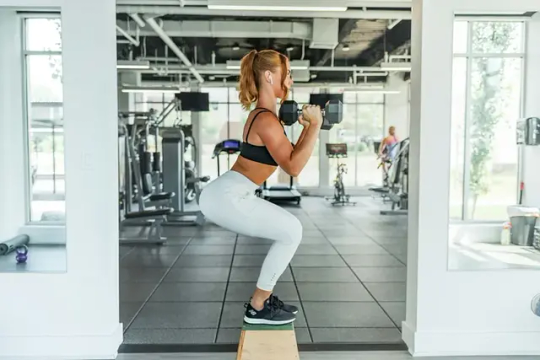
A healthy weight is achieved and maintained through a balance between exercise and nutrition. While limiting processed foods and sugary snacks, women should place a higher priority on nutrient-dense whole foods, such as an abundance of fruits and vegetables, lean proteins, and healthy fats. Maintaining a healthy weight can be maximized by combining regular exercise, such as strength training and cardiovascular exercises, with a well-rounded diet.
By reading this Ebook obese women can solve many of their problems Click Here
Incorporating Lifestyle Changes
Long-term weight management requires implementing lifestyle changes in addition to diet and exercise. Getting enough sleep, controlling stress, drinking plenty of water, and forming a solid support system are all important factors that can help a woman reach her weight loss objectives.
Nutrition Strategies for Effective Weight Loss
Weight loss is largely influenced by nutrition, and women can effectively support their goals by optimizing their food choices.
Emphasising Whole Foods
It is imperative to prioritize complete, unprocessed foods in order to supply the body with necessary nutrients while reducing unnecessary calories and harmful substances. Meals that are high in fruits, vegetables, whole grains, lean proteins, and healthy fats can help women lose weight and feel full and energized.
Mindful Eating and Portion Control
Women who practice portion control and mindful eating are better able to recognise their bodies’ signals of hunger and fullness, which helps them avoid overindulging and supports good weight management. Mindless snacking can be less likely by eating mindfully, chewing food carefully, and savoring every bite. These practices can also increase satisfaction.
Controlling Intake of Macronutrients
Maintaining optimal energy levels, promoting muscle growth and repair, and controlling appetite all depend on the balance of macronutrients, which include proteins, lipids, and carbs. Every meal should have a balance of the three macronutrients, with whole grains, lean proteins, and healthy fats being the top choices for women.
Exercise Regimens Tailored for Women
Any weight loss programme must include exercise, and women might get the most benefit from mixing up their routines to get the most out of it.
Strength Training for Metabolic Boost
Women benefit most from strength training because it increases lean muscle mass, which raises metabolism and improves fat burning. Women can enhance body composition, gain strength, and lose weight by including resistance activities like bodyweight exercises, resistance band workouts, and weightlifting into a weekly regimen.
Cardiovascular Workout to Burn Fat
Cardiovascular activity is a great way to increase cardiovascular health, burn calories, and enhance general wellbeing. Regular engagement in physical activities including walking, jogging, cycling, swimming, and dancing can raise heart rate, boost calorie expenditure, and aid in weight loss.
Incorporating Flexibility and Balance
Women should include flexibility and balancing exercises in their fitness regimen in addition to strength training and cardiovascular exercise to increase mobility, lower their risk of injury, and improve overall physical function. Exercises like yoga, pilates, stretching, and balancing can enhance other workouts and advance overall health.
Lifestyle Practices that Aid in Losing Weight
Adopting good lifestyle behaviors is crucial for sustaining long-term success in weight loss attempts, in addition to food and exercise.
Making sleep and stress reduction a priority

Getting enough sleep is essential for controlling hormones that govern hunger and metabolism, which makes it a critical component of weight loss. To control stress levels and enhance general wellbeing, women should strive for seven to nine hours of good sleep each night and use relaxation methods like deep breathing, yoga, and meditation.
Hydration’s Effect on Losing Weight
Maintaining hydration is critical for promoting metabolism, facilitating digestion, and controlling hunger. To encourage satiety and avoid overeating, women should make it a goal to drink lots of water throughout the day, especially before meals. Choosing foods high in water, such fruits, vegetables, and soups, can also help you stay hydrated and lose weight.
Building a Support Network
A woman’s weight loss journey can be greatly impacted by having a solid support system because it can offer inspiration, accountability, and encouragement. Women should surround themselves with like-minded friends, relatives, or support groups that can help them along the road and provide understanding, support, and direction.
In conclusion, reaching and maintaining a healthy weight necessitates a multimodal strategy that takes into account lifestyle adjustments, activity, and diet specific to the needs of women. Women can start on a successful weight reduction journey and realize their goals in the long run by identifying the obstacles they encounter, setting realistic goals, emphasizing regular exercise and a balanced diet, and embracing healthy lifestyle practices.
Without any side affect Women’s use this supplement for weight loss click here
Disclaimer: There are affiliate links in the link given above and if you buy something, I'll get a commission to meet my educational expenses but no extra cost to you.
#weight#i wanna lose weight#weight loss#i need to lose so much weight#lose weight#lose weight fast#lose weight tips#lose weight motivation#lose weight at home#lose weight without exercise#smart women#tumbler
2 notes
·
View notes
Text
What diet should I eat to reduce belly fat?

Reducing belly fat often involves a combination of dietary changes, exercise, and lifestyle adjustments. Here are some dietary tips that can help:
Reduce calorie intake: To lose belly fat, you generally need to consume fewer calories than you expend. Focus on eating nutrient-dense foods that keep you full longer, such as vegetables, fruits, lean proteins, and whole grains.
Watch portion sizes: Be mindful of portion sizes, especially for high-calorie foods like nuts, oils, and meats.
Limit added sugars: Sugary foods and beverages can contribute to belly fat. Cut back on sugary drinks, desserts, and processed snacks.
Choose complex carbs: Opt for complex carbohydrates like whole grains, legumes, and vegetables over refined carbs like white bread and sugary cereals. These can help keep you full and provide steady energy.
Increase fiber intake: Fiber-rich foods, such as fruits, vegetables, and whole grains, can help you feel full and satisfied while also aiding digestion and promoting weight loss.
Focus on healthy fats: Include sources of healthy fats in your diet, such as avocados, nuts, seeds, and olive oil. These fats can help keep you full and satisfied, while also providing essential nutrients.
Stay hydrated: Drinking plenty of water throughout the day can help control appetite and prevent overeating. Sometimes thirst can be mistaken for hunger.
Limit alcohol consumption: Alcoholic beverages can be high in calories and may contribute to belly fat. Limit your intake of alcohol, and opt for lower-calorie options when you do drink.
Be mindful of snacking: Choose healthy snacks like fruits, vegetables, nuts, or yogurt instead of processed snacks high in sugar and unhealthy fats.
Eat protein-rich foods: Including protein-rich foods in your meals and snacks can help you feel full and satisfied, which may prevent overeating. Good sources of protein include lean meats, poultry, fish, eggs, tofu, beans, and legumes.
Limit processed foods: Processed foods often contain added sugars, unhealthy fats, and empty calories. Opt for whole, minimally processed foods as much as possible.
Incorporate regular exercise: While diet plays a significant role in reducing belly fat, incorporating regular exercise is also important. Aim for a combination of cardio exercises (like walking, running, cycling, or swimming) and strength training exercises (such as weightlifting or bodyweight exercises) to help burn calories and build muscle.
Include probiotic-rich foods: Probiotics, found in foods like yogurt, kefir, kimchi, and sauerkraut, may help improve gut health, which could indirectly aid in weight loss and reduce belly fat.
Manage stress: Chronic stress can lead to weight gain, particularly around the belly area. Practice stress-reducing techniques such as meditation, deep breathing exercises, yoga, or spending time in nature to help manage stress levels.
Get enough sleep: Poor sleep habits have been linked to weight gain and increased belly fat. Aim for 7–9 hours of quality sleep per night to support your weight loss efforts.
Avoid crash diets: Crash diets may lead to rapid weight loss initially, but they’re often unsustainable and can result in muscle loss and a rebound in weight gain. Instead, focus on making long-term, sustainable lifestyle changes.
Track your progress: Keep track of your food intake, exercise routine, and progress toward your goals. This can help you stay accountable and identify areas where you may need to make adjustments.
Be patient and consistent: Losing belly fat takes time and consistency. Be patient with yourself and celebrate small victories along the way. Stay committed to your healthy eating and exercise habits, and you’ll gradually see results.
Remember, consistency is key when it comes to losing belly fat. It’s also important to combine a healthy diet with regular exercise and adequate sleep for optimal results. If you have any underlying health conditions or concerns, it’s always a good idea to consult with a healthcare professional or a registered dietitian before making significant changes to your diet.
#belly fat#fat belly#lose weight#fatloss#healthy#weight loss#weightloss#diet to lose weight#fatlosstips#losing weight#fat loss#health#fatter#fatty#obesity#fat piggy
2 notes
·
View notes
Text
BEST OF HEALTH TIPS NUTRITION AND DIET
Are you ready to unlock the secrets to a healthy lifestyle through nutrition and diet? If you’re looking to boost your well-being and achieve optimal health, this article is for you. Get ready to discover the power of balanced nutrition and healthy eating habits that can revolutionize your life.
Imagine a world where you have the energy to conquer your daily tasks, the resilience to combat illnesses, and the vitality to live life to the fullest. It all starts with what you put on your plate. By fueling your body with the right nutrients, you can unlock your true potential and become the healthiest version of yourself.
In this article, we’ll share 25 expert tips and insights to help you optimize your nutrition and diet for lasting health benefits. From simple food swaps to mindful eating techniques, we’ll cover everything you need to know to make informed decisions about what you eat. Say goodbye to crash diets and hello to a sustainable, nourishing approach to eating.
Key Takeaways
Discover the power of balanced nutrition for overall health and vitality.
Explore simple food swaps that can make a big difference in your well-being.
Learn techniques for mindful eating and portion control.
Uncover the secrets of successful grocery shopping and meal planning.
Find out how to increase your protein intake and why it’s important.
PLATING AND PACING YOUR MEALS
When it comes to optimizing your nutrition and diet, portion control and mindful eating play a crucial role. But did you know that meal presentation can also impact your overall eating experience? By paying attention to plating and pacing your meals, you can make your dining experience more enjoyable and improve your relationship with food.
Eating from smaller plates is a simple yet effective strategy for portion control. Studies have shown that using smaller plates can trick your brain into thinking you’re eating more, leading to increased feelings of satiety and reduced energy intake. So, grab those salad plates and give yourself a visual illusion of a fuller plate!
Meal presentation goes beyond just the size of your plate. Starting your meals with a serving of greens not only adds a pop of color to your plate but also ensures you consume more nutrient-dense foods. Whether it’s a vibrant salad or a side of steamed vegetables, incorporating greens can boost the nutritional value of your meal and potentially aid in weight loss.
To further enhance portion control, keep dressings and condiments on the side. By dipping your fork into the dressing instead of pouring it directly onto your food, you’ll have better control over how much you consume. This small adjustment can help reduce unnecessary calorie intake while still enjoying the flavors you love.
2 notes
·
View notes
Text
How Do I Get Serious About Losing Weight?
Assess Your Motivation
Reflect on why you want to lose weight and set clear, realistic goals.
Identify your personal motivations and use them to stay focused and committed.
Educate Yourself
Learn about healthy eating habits, portion control, and the importance of regular exercise.
Understand the principles of weight loss and how to create a calorie deficit.
Create a Plan
Develop a structured weight loss plan that includes specific dietary and exercise goals.
Break down your goals into smaller, achievable steps to prevent overwhelm.
Make Sustainable Changes
Focus on making sustainable lifestyle changes rather than opting for quick-fix solutions.
Gradually incorporate healthier habits into your daily routine to ensure long-term success.
Prioritize Nutrition
Emphasize whole, nutrient-dense foods such as fruits, vegetables, lean proteins, and whole grains.
Limit processed foods, sugary snacks, and excessive calorie intake.
Get Moving
Incorporate regular physical activity into your routine, aiming for at least 150 minutes of moderate-intensity exercise per week.
Find activities you enjoy to stay motivated and make exercise a habit.
Stay Accountable
Hold yourself accountable by tracking your progress, whether it's through food journals, fitness apps, or accountability partners.
Celebrate your successes and learn from any setbacks along the way.
Seek Support
Surround yourself with a supportive network of friends, family, or online communities who can offer encouragement and guidance.
Consider seeking professional help from a registered dietitian or personal trainer if needed.
Stay Consistent
Consistency is key to successful weight loss, so stick to your plan even when faced with challenges or setbacks.
Remember that progress takes time, and be patient with yourself throughout the journey.
Conclusion
Getting serious about losing weight requires commitment, education, and a willingness to make sustainable lifestyle changes. By assessing your motivation, creating a plan, prioritizing nutrition, and staying consistent, you can achieve your weight loss goals and improve your overall health and well-being.
Visit Here: https://bit.ly/3vSCvSt
#mental health#self reflection#be yourself#self improvement#self help#new life#letting go#inspirational quotes#new beginnings#positivity#therapy#self therapy#survival#affirmations#manifesation#study blog#2024 goals#2024#2024 planner#clean girl#it girl#pinterest girl#girlblogging#this is a girlblog#that girl energy#becoming that girl#healthy eating#healthy lifestyle#health and wellness#wellness girl
2 notes
·
View notes
Text
How to reduce weight naturally.

Get Premium Weight loss Coaching Here >>> Premium Weight Coaching
In the quest for weight loss, the path of natural methods stands as a beacon of sustainability and health. Understanding the dynamics of natural weight loss not only helps shed unwanted pounds but also fosters a lifestyle of wellness. Let's delve into the intricate details of reducing weight naturally, exploring the fundamental principles and practical strategies for achieving lasting results.
Setting Realistic Goals.
Assessing Your Current State.
Before embarking on any weight loss journey, it's crucial to take stock of where you currently stand. Assessing factors like current weight, dietary habits, and activity levels provides a baseline for setting realistic goals.
Establishing Achievable Targets.
Setting goals that are challenging yet attainable is key to staying motivated and focused. Break down larger goals into smaller, manageable steps to track progress effectively and celebrate achievements along the way.
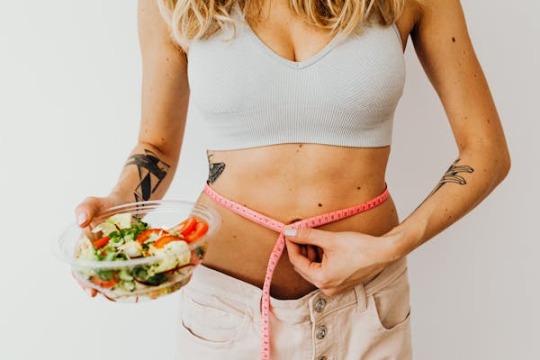
Get Premium Weight loss Coaching Here >>> Premium Weight Coaching
Nutrition and Diet.
Embracing Whole Foods.
The cornerstone of natural weight loss lies in embracing whole, nutrient-dense foods. Incorporating a variety of fruits, vegetables, lean proteins, and healthy fats ensures a well-rounded diet that supports weight loss and overall health.
Balancing Micro-nutrients.
In addition to macronutrients like carbohydrates, proteins, and fats, micronutrients play a crucial role in supporting various bodily functions. Ensuring a balanced intake of vitamins and minerals promotes optimal health and aids in weight management.
Portion Control.
Mindful Eating Techniques.
Practicing mindfulness during meals can help prevent overeating by tuning into hunger and fullness cues. Slow down, savor each bite, and pay attention to feelings of satiety to avoid consuming excess calories.
Utilizing Smaller Plates.
Using smaller plates and bowls can trick the mind into feeling satisfied with smaller portions. This simple yet effective strategy helps control portion sizes and promotes mindful eating habits.
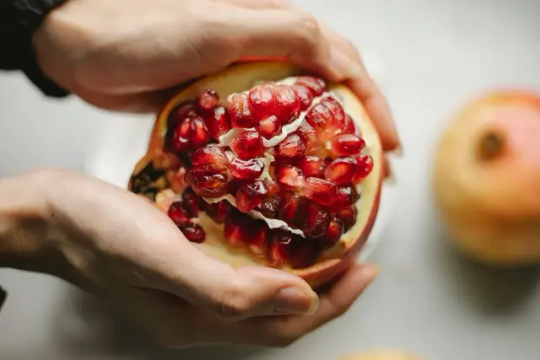
Get Premium Weight loss Coaching Here >>> Premium Weight Coaching
Hydration.
Importance of Water Intake.
Staying adequately hydrated is essential for overall health and plays a significant role in weight management. Drinking water helps boost metabolism, flush out toxins, and suppress appetite naturally.
Hydrating Effects on Metabolism.
Drinking water can temporarily increase the body's metabolism, leading to more calories burned throughout the day. Sipping on water regularly, especially before meals, can support weight loss efforts.
Suppressing Appetite Naturally.
Often, feelings of hunger are mistaken for thirst. Drinking water before meals can help curb appetite, leading to reduced calorie intake and supporting weight loss goals.
Alternative Beverages.
Exploring Herbal Teas and Infusions.
Incorporating herbal teas and infusions into your daily routine provides hydration along with various health benefits. Certain herbal blends, such as green tea, may even aid in boosting metabolism and promoting fat loss.
Incorporating Fresh Juices.
Freshly squeezed juices from fruits and vegetables offer hydration and a dose of essential nutrients. However, it's essential to consume them in moderation due to their naturally occurring sugars.
Physical Activity.
Finding Enjoyable Exercises.
Discovering physical activities that you enjoy makes it easier to stay consistent with your fitness routine. Whether it's dancing, cycling, or hiking, finding activities that bring you joy can make exercise feel less like a chore.
Exploring Various Workouts.
Variety is key when it comes to exercise. Mixing up your workouts not only prevents boredom but also challenges different muscle groups and keeps your body guessing, leading to more significant results.
Incorporating Daily Movement.
In addition to structured workouts, prioritizing daily movement is essential for overall health and weight management. Simple habits like taking the stairs, walking instead of driving, and stretching regularly can add up to significant calorie expenditure over time.

Get Premium Weight loss Coaching Here >>> Premium Weight Coaching
Strength Training Benefits
Building Lean Muscle Mass
Incorporating strength training into your fitness routine helps build lean muscle mass, which in turn boosts metabolism and increases calorie burn, even at rest. Aim to include resistance exercises at least two to three times per week.
Boosting Metabolism
Unlike cardio exercises, which primarily burn calories during the activity, strength training continues to rev up your metabolism post-workout. This phenomenon, known as excess post-exercise oxygen consumption (EPOC), means you'll continue to burn calories at an elevated rate even after you've finished your workout.
Sleep and Stress Management
Prioritizing Quality Sleep
Quality sleep is essential for overall health and plays a crucial role in weight management. Aim for seven to nine hours of uninterrupted sleep each night to support hormone regulation and appetite control.
Impact on Hormonal Balance
Lack of sleep disrupts the body's hormonal balance, leading to increased hunger hormones and decreased levels of satiety hormones. This hormonal imbalance can sabotage weight loss efforts and lead to overeating.
Regulating Appetite Hormones
Getting adequate sleep helps regulate hormones like leptin and ghrelin, which control hunger and appetite. Prioritizing quality sleep supports proper hormone function, making it easier to resist cravings and maintain a healthy weight.
Stress Reduction Techniques
Meditation and Mindfulness
Practicing mindfulness meditation can help reduce stress levels and promote a sense of calmness and well-being. Set aside time each day for meditation or deep breathing exercises to alleviate stress and support weight loss goals.
Engaging in Relaxing Activities
Incorporating relaxing activities like yoga, tai chi, or spending time in nature can help reduce cortisol levels and combat stress. Finding activities that help you unwind and recharge is essential for maintaining overall health and well-being.
Hormonal Balance
Understanding the Role of Hormones
Hormones play a significant role in regulating metabolism, appetite, and weight. Understanding how hormones impact your body can help you make informed decisions about your lifestyle and dietary choices.
Impact on Weight Regulation
Imbalances in hormones like insulin, cortisol, thyroid hormones, and sex hormones can disrupt the body's ability to regulate weight. Addressing underlying hormonal imbalances is essential for achieving sustainable weight loss.
Identifying Imbalances
Common signs of hormonal imbalances include unexplained weight gain or difficulty losing weight, fatigue, mood swings, and changes in appetite. Consulting with a healthcare professional can help identify and address any underlying hormonal issues.
Natural Remedies and Supplements
Herbal Supplements
Certain herbs and natural supplements may help support hormonal balance and promote weight loss. Examples include ashwagandha, rhodiola, and holy basil, which have adaptogenic properties that help the body cope with stress and support overall health.
Lifestyle Adjustments
In addition to supplements, making lifestyle adjustments like managing stress, getting adequate sleep, and eating a balanced diet can help support hormonal balance naturally. Focus on creating a holistic approach to wellness that addresses all aspects of your health.
Meal Planning and Preparation
Importance of Planning Ahead
Meal planning is a cornerstone of successful weight loss. Taking the time to plan and prepare meals ahead of time helps prevent impulsive food choices and ensures that you have healthy options readily available.
Preventing Impulsive Choices
Without a plan in place, it's easy to fall into the trap of reaching for convenient but unhealthy options when hunger strikes. Having pre-planned meals and snacks on hand helps avoid impulsive choices and supports your weight loss goals.
Ensuring Nutrient-Rich Meals
When meal planning, focus on creating balanced meals that provide a variety of nutrients to fuel your body. Incorporate lean proteins, whole grains, fruits, vegetables, and healthy fats to ensure that your meals are both satisfying and nourishing.

Get Premium Weight loss Coaching Here >>> Premium Weight Coaching
Meal Prepping Strategies
Batch Cooking
Batch cooking is a time-saving meal prep strategy that involves preparing large quantities of food at once and portioning them out for future meals. Cook grains, proteins, and vegetables in bulk, then mix and match to create a variety of meals throughout the week.
Preparing Healthy Snacks
Having healthy snacks on hand can help prevent mindless munching on less nutritious options. Prepare snacks like cut-up veggies with hummus, Greek yogurt with fruit, or nuts and seeds for a quick and satisfying bite between meals.
Mindset and Motivation
Cultivating a Positive Attitude
Maintaining a positive attitude is crucial for staying motivated and resilient on your weight loss journey. Focus on progress rather than perfection, and celebrate each small victory along the way.
Focusing on Progress, Not Perfection
No one is perfect, and setbacks are a natural part of the process. Instead of dwelling on mistakes or slip-ups, focus on how far you've come and the progress you've made toward your goals.
Celebrating Achievements
Take time to celebrate your achievements, no matter how small. Whether it's hitting a fitness milestone, resisting temptation, or making healthier choices, acknowledging your successes helps reinforce positive behaviors and boosts motivation.
Surrounding Yourself with Support
Accountability Partners
Having a support system in place can make all the difference in reaching your weight loss goals. Share your goals with friends, family, or a support group, and enlist their help in holding you accountable and providing encouragement along the way.
Seeking Professional Guidance
If you're struggling to achieve your weight loss goals on your own, don't hesitate to seek professional guidance. A registered dietitian, nutritionist, or personal trainer can provide personalized advice and support to help you succeed.

www.angelasuckau.com
Get Premium Weight loss Coaching Here >>> Premium Weight Coaching
Tracking Progress
Utilizing Measurements and Data
Tracking your progress is essential for staying on course and identifying areas for improvement. Keep a food diary, take measurements, and monitor changes in weight and body composition to assess your progress accurately.
Keeping a Food Diary
Keeping a detailed record of your food intake can help you identify patterns, track your calorie intake, and pinpoint areas where you may need to make adjustments. Be honest and consistent with your tracking to get the most accurate picture of your eating habits.
Monitoring Physical Changes
In addition to tracking numbers on a scale, pay attention to how your body feels and any physical changes you notice. Increased energy levels, improved mood, and changes in clothing size can all be indicators of progress beyond just weight loss.
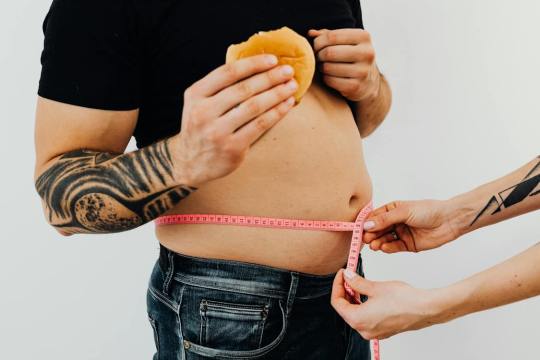
Get Premium Weight loss Coaching Here >>> Premium Weight Coaching
DISCLAIMER:
There are an affiliate link in this article which may make some profit for me.
#health and wellness#health & fitness#i wanna lose weight#weight loss#i need to lose so much weight#gaining weight on purpose#i need to lose this weight
2 notes
·
View notes